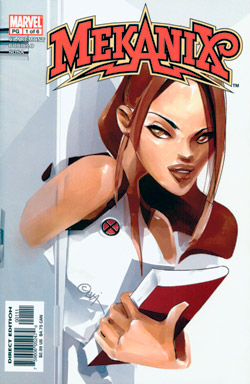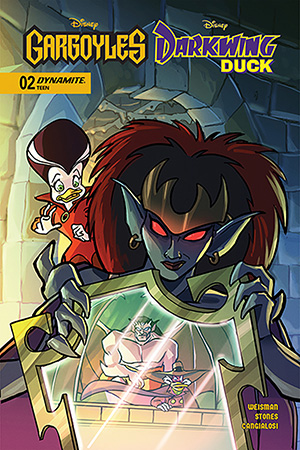|
 |
Waiting
For Tommy
By Richard Johnston
RICHARD:
Why does this only seem to benefit your X-Men? The only one
that seems to get attention? Sovereign Seven, Gen
13, Star
Trek, even Fantastic
Four, in comparison they seem to be ignored by retailers,
fans, readers and pundits. Yet the moment your name is associated
with X-Men, in they come running - and we're getting to the
stage when many of them weren't reading comics when you were
writing X-Men the first time.
CHRIS: Force of habit, maybe? It's a rare privilege
to serve as the defining element of a generation, even if
it's only generation of comic books. A friend of mine recently
observed that, given my output and the length of time involved,
there are easily well over one hundred million copies of my
work in print in the US. And that doesn't count reprints,
trade compilation, foreign editions and what-have-you. That
represents an awesome - even daunting -- benchmark against
which to measure current ambitions and success. But since
the vast preponderance of that work consists of X-Canon material,
it also casts a huge shadow over anything else I decide to
do. I spent better than twenty years establishing a certain
"comfort zone" for the readers, and I confess for myself.
A personal "brand identity", if you will. Chris Claremont
= X-Men, end of story. Breaking that mould by moving on to
other companies, other series, means stepping outside that
zone for both parties. That means building the author/audience
relationship all over again, in whole new terms. By way of
comparison, everyone had the highest of hopes - given the
tremendous success of Daredevil
- for Frank
Miller's Ronin. That was great stuff. But commercially,
a goose egg! Because Frank stepped outside the Comfort Zone
established on Daredevil and at that point in time the readers
weren't prepared to follow. Ironically, the work he did on
Ronin paved the way for Dark Knight, which redefined the relationship
and the character in whole new ways, to everyone's benefit,
with repercussions that last to this day. So Frank wins in
the end.
In my own case, as regards Sovereign - what can I say? Not
every concept clicks, not every book is guaranteed success.
The creative synergy wasn't there in any way that resonated
with the audience. Star Trek: Debt of Honor sold out its print
run in barely two weeks, and the trade edition did equally
well, so I don't think that falls within your paradigm. In
terms of the Fantastic Four, while Salva and I took some fan
flak in the early issues, the book was always a consistent
top seller. By the time we really got rolling with the "Doom"
arc that concluded our run, reader reaction to the title was
extremely positive and we closed-out as a Top Ten title, ending
higher on the Diamond listings (I believe) than when Salva
and I started. Readers had certain expectations, for me as
a writer and for the title itself; it took time to lead them
to the point where they were willing to accept - and enjoy
-- the book and us on our own terms. What I found most frustrating
was being removed as writer just when it felt like Salva and
I were poised to kick things to the next level and really
start having fun.
Gen-13 - I hope the jury's still out but again, readers
approach the title with their inherent expectations and prejudices.
In this case, since we're talking about a global reboot of
a well-established series, the bar was set far higher than
would otherwise be normal. Firstly and foremost, we faced
the challenge of overcoming the already existing brand identity
of the series. Gen-13 has ten years of history with the marketplace;
now that same marketplace is being presented with something
completely different, that derives as little as possible from
the existing continuity. That means assaulting a decade's
worth of ingrained prejudices and preconceptions (both good
and bad). This also applies to the writer, who comes with
his own (considerable) train of baggage. That means trying
to find a way to invite in those readers who weren't interested
in the previous iteration, while holding onto those readers
who stuck with the book to its end (and who may not appreciate
the abrupt dismissal of characters and a Universe they'd so
heavily invested in.) No easy task. How do I feel about the
series? Quite passionate, actually. I think it represents
some of my best work, in part because it stems from a very
real time and place, because what (editor) Bob Harras and
I were determined to accomplish from the start was to ground
this series and these characters in our world. We wanted to
create accessible, likeable - young - characters and view
them from a fundamentally positive perspective. They have
problems, yes; their lives have been turned upside-down, yes;
but the gist of their response, and of most of the people
they deal with (government included) is ultimately hopeful.
Right now, at this point in my life as creator and as audience
I have no time and less patience for dystopias. I read on-line
posts demanding that books become more "relevant" which turns
out to be interpreted as darker and bleaker in tone, less
mythic, less likeable, far less interesting. In some respects,
this might be called the "Brutalist" age of comics. Characters
who should be far larger than life have become small and tawdry
and inconsequential. The stories I read, the characters I
see, provide me with no enjoyment. To my own mind, it's no
accident that one of the surprise hits of this year has been
Jim
Lee and Jeph
Loeb's Batman, which is basically the classic character
in some pretty classic stories, produced with style and panache,
our equivalent of a big-screen, big-budget motion picture.
Am I right in my assessment or is my thinking hopelessly mired
in the last century? I don't know. But it seems in the broader
arena of popular culture, the films and TV shows that succeed
are those with clear-cut, well-defined heroes - and villains
- and conflicts, whose characters are accessible and likeable.
There might be a lesson there, since compared to the worst
of them our best commercial efforts are pretty much inconsequential.

X-MEN: MEKANIX #1 – SIGNED |
RICHARD: Talking of which, "Trust A Few. Fear
The Rest". Did you find that to be a sensitive enough
strapline for a story about prejudice against minorities?
CHRIS: Sure. As valid certainly as its antithesis:
"Fear a Few. Trust the Rest." A strapline is a strapline,
it's a concept, a slogan, advertising. It's where you
go with it that makes the difference.
RICHARD: Where did it go, for you? You were
quoted as blaming much of what the X-titles had become
on your editor and then editor-in-chief, Bob Harras.
How did you reconcile this before your run on Gen 13?
And how does the current regime compare to Marvel, when
you left it? |
CHRIS: Bob and I had our differences and at the time
they were both passionate and considerable. Over time, we
resolved them. Once more, we became colleagues and friends.
You got a problem with happy endings?
RICHARD: Ah, my favourite Star Wars movie was The
Empire Strikes Back. Probably something in my genes. You were
quoted at one point, after leaving the X-titles in the mid-nineties,
that your characters were being raped and gutted. How did
you reconcile that on your return a few years ago, and did
you feel the film treated the characters better? What about
the sequel?
CHRIS: Times change, attitudes change, circumstances
change, people change - hopefully for the better. I made my
decision to return to Marvel, and ultimately to the X-Men
for the same reason that I decided to leave in 1991, because
it felt like the right thing to do. The nice thing about the
hiatus was that it enabled me to approach the characters and
the Canon with what I hoped was a relatively fresh and objective
eye, so I could examine what worked with them and what did
not in ways that I perhaps couldn't have done earlier, being
so immersed for so long in the book and their "lives." The
delightful discovery was that, on returning, the passion I
felt for the characters and the sense that there were still
a great many stories yet to tell about them was as strong
as it ever was. Three years later, that hasn't changed.
As far as the movies are concerned, I feel both X-Men and
X2 have been extraordinarily faithful to the heart and soul
- the essence of the characters, and of the concept. That's
what made writing the novelization so much fun: I was depicting
in prose characters who were substantially the people I'd
been writing all these many years in comics. The only difference
being that now I had real faces and voices to append to these
creations of pen and ink.
RICHARD: The new X-Men movie appears to be based
around God Loves Man Kills, despite denials by the studio.
X-Treme X-Men is going to contain a direct sequel to that
story, do you believe the original stands up twenty years
on?
CHRIS: Yes.
RICHARD: Okay... while the demographic age of comic
readers may increase, there will still be a considerable number
of your readers who weren't reading comics - hell, they may
not have been alive then. "Dark Phoenix" is a reference in
Buffy that they never got. Has anything significant changed
in the issues in God Loves, Man Kills? The book seems to have
a pointed, indeed satirical take on religion, specifically
of the evangelical Christian variety, though it's clearly
about wider themes of bigotry and even the very humanness
of evil. What aspects of current society and recent history
do you believe it has relevance to? And how does the sequel
develop those?
CHRIS: I think, I hope, the sequel continues the
debate posed in its predecessor, again focused through the
prism of Kitty Pryde, about the nature of good and evil, the
role of faith and the responsibility of ethical people - especially
"super-heroes" -- in confronting these challenges. The success
in resolving these questions is better posed to the readers,
when the story's done.
RICHARD: Watch this space. Right. The question everyone
wants answered. Is Lockheed gay? If so, could there be a best
selling mini-series in it? The Dragon Love That Dare Not Flame
Its Name?
CHRIS: I don't recall I've ever established Lockheed's
gender. (Although I freely confess to being wrong should someone
wish to correct me.) So what are we talking here? Lockheed's
a lady and we're looking at inter-species romance with Kitty?
(And readers thought all those stolen moments with Karma in
MekaniX were just throw-aways, hah! Just laying yet another
layer of Loose Ends on the Canon. Damn, and I was just gearing
up to pitch a relationship between her and Logan!)
Time will tell. And as I find myself fond of saying, especially
concerning comics, anything's possible.
X-Treme X-Men is published monthly, and then some, from
Marvel Comics. Rich Johnston writes Lying In The Gutters http://litg.comicbookresources.com
and is currently preparing for the Live-Ing In the Gutters
at this year's Bristol Comics Convention http://www.sitsvac.org/C2001.html
Page: 1 | 2
|
The
Waiting For Tommy Archive |
- WFT
Edition on October 13, 2004
- WFT
Edition on July 30, 2004
- WFT
Edition on June 23, 2004
- WFT
Edition on June 16, 2004
- WFT
Edition on June 9, 2004
- WFT
Edition on May 26, 2004
- WFT
Edition on May 5, 2004
- WFT
Edition on April 6, 2004
- WFT
Edition on March 31, 2004
- WFT
Edition on March 17, 2004
- WFT
Edition on March 10, 2004
- WFT
Edition on March 3, 2004
- WFT
Edition on February 25, 2004
- WFT
Edition on February 19, 2004
- WFT
Edition on February 12, 2004
- WFT
Edition on February 5, 2004
- WFT
Edition on January 28, 2004
- WFT
Edition on January 21, 2004
- WFT
Edition on January 14, 2004
- WFT
Edition on December 31, 2003
- WFT
Edition on December 24, 2003
- WFT
Edition on December 17, 2003
- WFT
Edition on December 10, 2003
- WFT
Edition on December 3, 2003
- WFT
Edition on November 26, 2003
- WFT
Edition on November 19, 2003
- WFT
Edition on November 12, 2003
- WFT
Edition on November 5, 2003
- WFT
Edition on October 30, 2003
- WFT
Edition on October 23, 2003
- WFT
Edition on October 16, 2003
- WFT
Edition on September 17, 2003
- WFT
Edition on September 3, 2003
- WFT
Edition on August 27, 2003
- WFT
Edition on August 20, 2003
- WFT
Edition on August 13, 2003
- WFT
Edition on August 6, 2003
- WFT
Edition on July 31, 2003
- WFT
Edition on July 24, 2003
- WFT
Edition on July 17, 2003
- WFT
Edition on July 10, 2003
|
- WFT
Edition on July 2, 2003
- WFT
Edition on June 25, 2003
- WFT
Edition on June 18, 2003
- WFT
Edition on June 11, 2003
- WFT
Edition on June 4, 2003
- WFT
Edition on May 28, 2003
- WFT
Edition on May 21, 2003
- WFT
Edition on May 14, 2003
- WFT
Edition on May 7, 2003
- WFT
Edition on April 30, 2003
- WFT
Edition on April 23, 2003
- WFT
Edition on April 9, 2003
- WFT
Edition on April 3, 2003
- WFT
Edition on March 26, 2003
- WFT
Edition on March 19, 2003
- WFT
Edition on March 12, 2003
- WFT
Edition on March 5, 2003
- WFT
Edition on February 26, 2003
- WFT
Edition on February 19, 2003
- WFT
Edition on February 12, 2003
- WFT
Edition on February 5, 2003
- WFT
Edition on January 29, 2003
- WFT
Edition on January 22, 2003
- WFT
Edition on January 15, 2003
- WFT
Edition on January 8, 2003
- WFT
Edition on January 1, 2003
- WFT
Edition on December 25, 2002
- WFT
Edition on December 17, 2002
- WFT
Edition on December 11, 2002
- WFT
Edition on December 4, 2002
- WFT
Edition on November 20, 2002
- WFT
Edition on November 13, 2002
- WFT
Edition on November 6, 2002
- WFT
Edition on October 30, 2002
- WFT
Edition on October 23, 2002
- WFT
Edition on October 16, 2002
- WFT
Edition on October 9,
2002
- WFT
Edition on October 2, 2002
- WFT
Edition on September 25 , 2002
- WFT
Edition on September 18 , 2002
- WFT
Edition on September 11 , 2002
- WFT
Edition on August 30, 2002
- WFT
Edition on August 23, 2002
- WFT
Edition on August 17, 2002
|
|
|
 |







